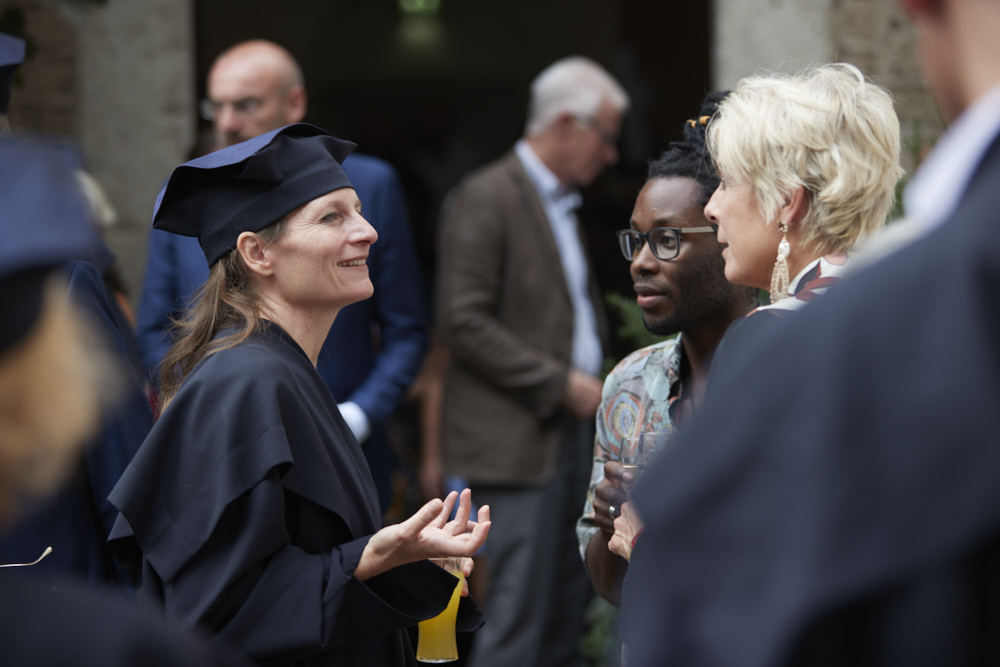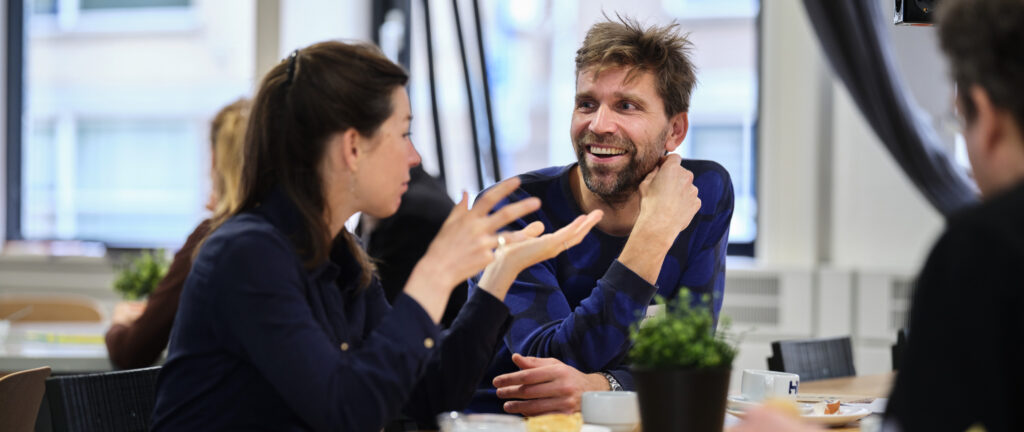Honorary doctorates

Every five years, during its Dies Natalis celebrations, the University of Humanistic Studies awards honorary doctorates to individuals who have been a significant source of inspiration for the university’s academic work.
2024 – 35th anniversary
Sheila Sitalsing and Kristján Kristjánsson
Sheila Sitalsing is an economist, journalist and member of the Dutch Press Council. She has worked for De Volkskrant, Het Oog op Morgen and One World, among others. In 2013, she won the Heldring Prize for political reporting. Honorary supervisor Menno Hurenkamp: ‘Sheila Sitalsing is a visible and vocal participant in public debate as a highly informed critic of bureaucratic excesses surrounding issues such as the benefits scandal and the complacent culture surrounding diversity and integration, among other things. Through a combination of tone and content, she has managed to secure a place in the social debate for various groups that do not automatically have a voice.’
Prof. Kristján Kristjánsson is Professor of Character Education and Virtue Ethics at the University of Birmingham, Deputy Director of the Jubilee Centre for Character and Virtue, and Professor at the University of Iceland and Boston College. Honorary supervisor Doret de Ruyter: “Kristján Kristjánsson’s impressive academic work covers the fields of moral education, moral psychology, moral philosophy and philosophy of education. His ability to combine these disciplines in a fruitful way makes his work surprising and innovative. His subjects relate to central humanistic values such as empathy, justice, friendship, moral emotions, wisdom and education.”
Previous honorary doctorates
-
2019
Prof. George Fitchett is a pioneer in the field of chaplaincy research in the United States. With many years of experience as a chaplain, trainer and supervisor, he is one of the most prominent researchers in the field. Fitchett has received numerous awards over the course of his academic career, and the many projects in which he served as principal investigator demonstrate his immense contribution to developing research in chaplaincy and to studying religion/spirituality and health care generally. He is also the founder of Transforming Chaplaincy – an international research institute on chaplaincy – and he has put chaplaincy on the map nationally by winning a grant from the National Institute of Health for research into the profession.
Prof. Philip Kitcher is a philosopher with a broad orientation in both research and education, who is well versed in other scientific disciplines as well, particularly in biology. He has for instance performed research in collaboration with Frans de Waal. His work field includes philosophy of science and the philosophy of biology. He is specifically interested in the ethical and political constraints of scientific research, in the development and history of altruism and morality, and in the purported conflict between science and religion. With an extensive publication list, Kitcher is a leading scholar and affiliated with one of the top universities in the United States.
Hartmut Rosa is one of the most prominent intellectuals of today. Carrying on in the tradition of phenomenology and critical theory, he analyses processes of humanisation and dehumanisation in contemporary society. Rosa offers an intriguing interpretation of our society by describing it as subject to social acceleration. Practices that cannot or can hardly accelerate, such as health care and democracy, appear lethargic by contrast. According to his analysis, acceleration leads to alienation. Introducing the concept of resonance, Rosa aims to offer concrete proposals for new forms of organisation in a post-capitalist society. His work has had a significant impact on a wide range of research fields, from education, Bildung and health care to the economy and sustainability. His work has been translated into numerous languages and has won various awards. Rosa is highly esteemed by sociologists and philosophers.
-
2014
Prof. Amartya Sen (Harvard University) is an internationally renowned intellectual and recipient of the 1998 Nobel Prize in Economics. His collective work has been highly inspirational and relevant to the ongoing development of Humanistic Studies. Sen is characteristically optimistic about the human condition and motivated by deep personal and professional concerns about democracy, justice, poverty and inequality across the world.
His interdisciplinary scholarly work spans many fields in social choice theory, economics, public health, gender studies and moral and political philosophy. He significantly influenced many governments and international organisations, including the United Nations. His well-known Capability Approach focuses on the moral significance of individuals’ capability to achieve the kind of lives they have reason to value.
A strong acknowledgment of human diversity is one of the key theoretical driving forces in his work and he believes that normative approaches should acknowledge the full human diversity and include the concerns of marginalised people. Sen supports Enlightenment values such as reason, justice and liberty, but believes that they are part of a common heritage of humanity and resists the idea that these values are necessarily tied to Western thought.Prof. Carol Ryff (University of Wisconsin) has developed a theory of psychological well-being which comprises elements that are also part of the concept of meaning in life. This theory of well-being is used in a large body of multidisciplinary empirical research on well-being, (bio-psychosocial) health, resilience and optimal aging. An important research project led by Prof. Ryff is MIDUS, a longitudinal study following behavioural, psychological, social and biological aging of U.S. adults and elderly.
Prof. Joan Tronto (University of Minnesota) has developed an ethics of care which tries to remedy some of the shortcomings of well-known ethical theories. Her interdisciplinary concept of care not only refers to health care but conceives of care as a political concept linked to the very core of democracy: caring is construing living together in an ordered way. Her concept of care corrects a gender bias in care theories by stressing the fact that all human beings are both care-givers and care-takers.
-
2009
Prof. Frans de Waal
Frans de Waal is professor of psychology at Emory University in Atlanta and director of the field station of the Yerkes National Primate Research Center. De Waal gained worldwide acclaim for his research into primate behaviour. He sees our sense of morals, not as a thin layer of varnish hiding a brutish inner nature, but as having deep evolutionary roots.Prof. Sarah Blaffer Hrdy
Sarah Blaffer Hrdy is a primatologist and anthropologist and emeritus professor at the University of California, Davis. Her work in the field of evolution theory is characterised as multi-disciplinary, inter-disciplinary and trans-disciplinary, and her feminist perspective with concomitant focus on human values makes her work highly relevant to the two central themes of Humanistic Studies: meanings of life and humanisation in human relations, organisations and society at large.Prof. Patricia de Martelaere
Patricia de Martelaere was a Belgian philosopher and writer and a professor at the University of Leuven. She died in 2009. How she managed to connect philosophy and practical living is directly relevant to the study of meanings in life and humanisation, as pursued at the University of Humanistic Studies. Her approach throws existential aspects of life and death into sharp relief. She demonstrated how the University’s pretty motto, ‘The most beautiful study is the human being’, should not distract us from the pain and discomfort that often afflicts human life. -
2004
Prof. Otto Duintjer
The University views his work on the intersection of philosophy and spirituality to be of huge social and scientific significance, also given the connection that Duintjer forges between humanism and spirituality. Otto Duintjer (1932) was professor of epistemology and metaphysics at the University of Amsterdam from 1970 to 1987. From 1987 until his retirement in 1997, he held the chair of philosophy and spirituality at the same institution.Prof. Seyla Benhabib
Seyla Benhabib (Istanbul 1950) is Eugene Meyer Professor of Political Science and Philosophy at Yale University. She previously held positions at Harvard University (1993-2000) and the New School for Social Research (1991-93). In the summer of 2000 Benhabib held the Baruch de Spinoza chair at the University of Amsterdam. She received the honorary doctorate in recognition of her significant contributions to the field of social theory, in particular regarding critical theory and the feminist perspective. -
1999
Prof. Rudi van den Hoofdakker (alias Rutger Kopland)
A psychiatrist as well as an acclaimed poet, the honorary doctorate was conferred in recognition of his contributions to formulating human values and the various forms of human knowledge, such as the therapeutic and biological on the one hand (a multidisciplinary approach to the human being), and the importance of poetry on the other. Member of the honorary doctorate committee, Henk Manschot: “Whoever seeks access to the humanity of man, must consult more language games than just the scientific one. It is fascinating to hear both the psychiatrist and the poet’s views on the matter.”Prof. Martha Nussbaum
Prof. Martha Nussbaum is professor of ethics and philosophy of law at the University of Chicago. The honorary doctorate was conferred in recognition of her expertise and understanding of the cultural heritage that forms one of the most fertile sources of European humanism. Henk Manschot: “The secret and the attraction of her approach is that she makes themes from the humanities, such as the pursuit of happiness, the quest for ‘the good life’, fertile ground for the contemporary issues that also concern Humanistic Studies: issues that impinge on the question of what makes a dignified human life.”


